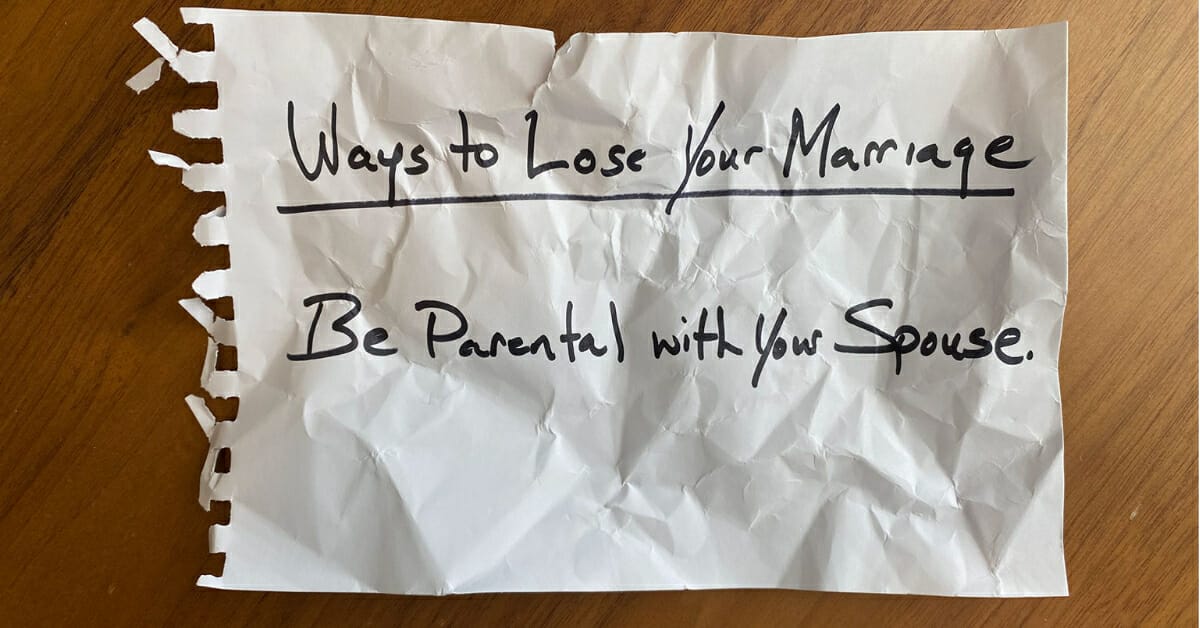I have a grandson who thinks he’s right about everything. Even the things he knows nothing about! No matter what you’re talking about, he typically takes the opposing opinion, and he’s convinced he’s right. Even if you show him he’s wrong, he won’t concede. He just walks away.
There are a lot of marriages out there where one or both spouses are always convinced they’re right. They take a stand and an opinion on various things, and they’ll ride the “I’m right” train to the very end of the line. And if you somehow prove they’re wrong, they will shift the point to something else, or just withdraw.
Why is it so Important for Some People to be Right?
Why is being right so important to some spouses? There can be a wide variety of reasons why a spouse becomes so doggedly determined to prove they’re right.
- Maybe they were raised in a home where being right was highly valued.
- Perhaps they saw their parents fight a lot about who was right or wrong.
- Maybe they were not believed in the past by parents, friends, or coworkers.
- Perhaps they’ve been wrongly accused in the past and suffered injustices.
- Maybe they struggle with low self-esteem, and being right is a way of feeling better about themselves.
- Perhaps they have a competitive personality that turns disagreements into competitions.
Whatever the case may be, there are spouses out there who just have to be right about everything. And maybe you’re one of them.
You Can be Right in the Wrong Way.
Now being right can seem like…well, it can seem right. But did you know that you can be right and still be wrong? In other words, you can be right in the wrong way.
You can be right in the wrong way when…
- You’re condescending.
- You cut your spouse off.
- You don’t consider your spouse’s thoughts and ideas.
- You’re competitive.
- You don’t control your emotions.
- You feel you need to dominate the situation or your spouse.
- You see everything as right or wrong…even the little things.
You may be right in some situations, but if you are right in the wrong way, you will lose more than you gain.
How to be right the right way?
I know that saying there’s a right way to be right sounds like I’m one of those people who always needs to be right. So, let’s just say there is a better way to be right. And it’s a way that will help both you and your spouse to stay connected despite disagreements.
When you feel you’re right about something, here are seven things to keep in mind:
Be kind.
If you’re right, kindness goes a long way to softening someone up and making it easier for them to admit it. And if you’re wrong, kindness makes being wrong easier to swallow.
Be considerate.
Everyone wants to feel heard…even if we’re wrong. This is especially true in marriage. Considering your spouse’s point of view will do one of two things. First, it may show you that you’re not as right as you thought you were. And second, it may show you how your right can be made better. Create space for your spouse and their views; even if you don’t agree with them.
Be compassionate.
Just as you need to consider their point of view, you also need to consider their feelings. Care about what they think. Right or wrong, their views may be driven by hurts, fears, or insecurities. These call for compassion, not conquering.
Don’t be competitive.
I know it’s easy in disagreements to get sucked into a competition to see who will come out on top. But remember…you’re both on the same team. If one of you loses, you both lose. If you become competitive, you will lose…even if you win. Marriage is not about competition. It’s about collaboration.
Don’t be condescending.
When you become condescending to your spouse…in words, tone, or attitude…you leave a lasting scar on them that apologies don’t erase. When you got married, you vowed to love and protect your spouse. But when you become condescending, you become the one inflicting harm. Consequently, it becomes harder and harder for your spouse to trust you.
Control your emotions.
When you’re in a disagreement with your spouse, it can be easy to let your emotions elevate and eventually run away with you. At that point: you elevate your volume, you use words you shouldn’t use, and you take on attitudes that do more harm than good…all for the sake of winning the argument. You may win the argument, but you will lose your spouse. I’m not saying your emotions are invalid or wrong. But you cannot let your emotions drive you in these situations because they will drive you over a cliff.
Consider if this is a hill to die on.
Finally, when it comes to being right, you need to consider whether this particular situation is really a hill worth dying on. There are some hills worth dying on. Hills like: abuse, betrayal, abandonment, substance abuse, child endangerment, illegal activity, etc. But for most spouses, the fight to be right is over much smaller hills. Hills like: whether someone’s parents are intrusive, whether there’s enough money in the clothing budget, who should be in charge of scheduling date nights, and whether to have sex twice a week or twice a month. Not every hill is a hill to die on.
A FINAL WORD…
If spouses put as much time and energy into being loving and supportive as they do into being right, the issue of who’s right and who’s wrong wouldn’t be such an issue. It’s not so much about having the right opinion as it is about being the right spouse. And this is not always about being right. You don’t have to compromise the truth, but you don’t always have to be right…even when you’re right.


